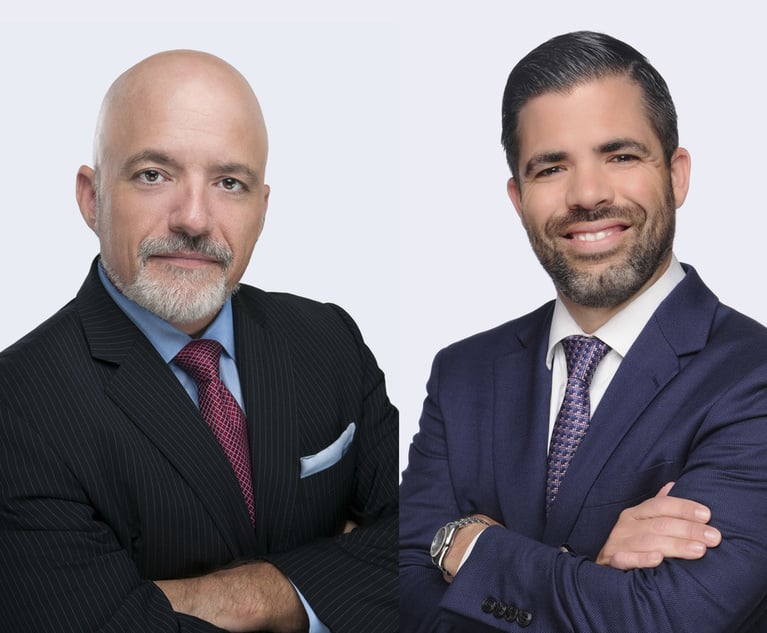Five Critical Tools for M&A Cybersecurity Due Diligence
Cybersecurity due diligence has become a bedrock component of mergers and acquisitions. Recent surveys have revealed that as many as 73% of buyers conducting due diligence have uncovered evidence of undisclosed data breaches.
April 17, 2020 at 06:22 PM
4 minute read
 Luis Salazar, partner with Salazar Law in Miami.
Luis Salazar, partner with Salazar Law in Miami.Cybersecurity due diligence has become a bedrock component of mergers and acquisitions. Recent surveys have revealed that as many as 73% of buyers conducting due diligence have uncovered evidence of undisclosed data breaches. Buyers—and sellers—have ample reasons to be concerned about cybersecurity risks given recent disastrous examples. For instance, Verizon's acquisition of Yahoo! was significantly disrupted when Yahoo! belatedly disclosed a major data breach that had been ongoing for more than two years. Yahoo! was forced to reduce its sales price by a whopping $350 million, and the Securities and Exchange Commission slapped the internet giant with a $35 million fine for failing to properly disclose the breach.
While not every deal is a multibillion acquisition, supporting the deployment of a cybersecurity due diligence team, there are five tools in the cybersecurity playbook that every buyer-side lawyer can use.
First, ask for a data inventory. A fundamental component of any data privacy or cybersecurity program, the inventory should include every piece of information stored or processed by the target company and provide an understanding of what sort of data is collected, where and how it is stored, what is it used for, if it is shared with another organization or group, and how long it is kept before being disposed. This inventory will, in turn, provide a buyer with a good, basic understanding of the potential laws and regulations that could apply.
Second, ask for a copy of any internal or external cybersecurity assessments or audits. Several of these assessments are employed now, from a full-blown cybersecurity audit, to penetration testing, to Payment Card Industry, or PCI, audits. These reports, or the lack of them, may reveal critical weaknesses in the target's cybersecurity system.
Third, obtain and scour any outward facing privacy statements. If any component of the target's value is based on consumer data, then a review of its privacy commitments is critical. Consumer's personally identifiable information (PII) may include name, addresses, emails, biometric information, IP addresses and much more. Surprisingly, many businesses still post privacy policies that do not give it appropriate permission to use PII in the ways they need and frequently represent that the business will not sell consumer PII to any third party. Businesses also often make contradictory privacy commitments through conflicting statements on sprawling websites, shopping carts and in live stores. Poorly worded or contradictory privacy statements can have a significant adverse impact on the value of any data assets being sold.
Fourth, ask for and review all third party and vendor contracts. The privacy and cybersecurity world has been virtually transformed by the passage of major legislation, like the EU's General Data Protection Regulation (GDPR) and the California Consumer Privacy Act (CCPA). In turn, these privacy laws have driven changes in vendor agreements that impose significant cyber and privacy compliance requirements. As part of due diligence, buyer's side counsel should be analyzing both whether the acquisition target has met its obligation under those laws and what obligations it has agreed to undertake. These undertakings may add increased costs to company operations, or seriously limit the usability of the data acquired.
Finally, think outside the due diligence space. If the acquirer has room in their budget, there are many nontraditional techniques buyers can employ to truly confirm a seller's representations about its cybersecurity. Dark web and threat intelligence searches can determine whether company data, including its intellectual property, is already "in the wild" and for sale to criminals everywhere. That could negatively impact a business's value.
Certainly, a successful cybersecurity due diligence effort should embrace these five tools and much more. And, of course this due diligence must be backed up with thorough representations and warranties and well thought out cyber insurance coverage. Arguably, there is an even more fundamental element needed: make sure a data privacy and cybersecurity lawyer leads the due diligence effort.
Luis Salazar is managing partner of Salazar Law and The Biometric Law Firm. A cerrtified information privacy professional, he advises clients on data privacy and cybersecurity issues relating to acquisitions around the globe. He can be reached at [email protected].
This content has been archived. It is available through our partners, LexisNexis® and Bloomberg Law.
To view this content, please continue to their sites.
Not a Lexis Subscriber?
Subscribe Now
Not a Bloomberg Law Subscriber?
Subscribe Now
NOT FOR REPRINT
© 2025 ALM Global, LLC, All Rights Reserved. Request academic re-use from www.copyright.com. All other uses, submit a request to [email protected]. For more information visit Asset & Logo Licensing.
You Might Like
View All



Trending Stories
- 1What’s at Stake in Supreme Court Case Over Religious Charter School?
- 2People in the News—Jan. 30, 2025—Rubin Glickman, Goldberg Segalla
- 3Georgia Republicans Push to Limit Lawsuits. But Would That Keep Insurance Rates From Rising?
- 4Trending Issues in Florida Construction Law That Attorneys Need to Be Aware Of
- 5The Importance of Judicial Elections
Who Got The Work
J. Brugh Lower of Gibbons has entered an appearance for industrial equipment supplier Devco Corporation in a pending trademark infringement lawsuit. The suit, accusing the defendant of selling knock-off Graco products, was filed Dec. 18 in New Jersey District Court by Rivkin Radler on behalf of Graco Inc. and Graco Minnesota. The case, assigned to U.S. District Judge Zahid N. Quraishi, is 3:24-cv-11294, Graco Inc. et al v. Devco Corporation.
Who Got The Work
Rebecca Maller-Stein and Kent A. Yalowitz of Arnold & Porter Kaye Scholer have entered their appearances for Hanaco Venture Capital and its executives, Lior Prosor and David Frankel, in a pending securities lawsuit. The action, filed on Dec. 24 in New York Southern District Court by Zell, Aron & Co. on behalf of Goldeneye Advisors, accuses the defendants of negligently and fraudulently managing the plaintiff's $1 million investment. The case, assigned to U.S. District Judge Vernon S. Broderick, is 1:24-cv-09918, Goldeneye Advisors, LLC v. Hanaco Venture Capital, Ltd. et al.
Who Got The Work
Attorneys from A&O Shearman has stepped in as defense counsel for Toronto-Dominion Bank and other defendants in a pending securities class action. The suit, filed Dec. 11 in New York Southern District Court by Bleichmar Fonti & Auld, accuses the defendants of concealing the bank's 'pervasive' deficiencies in regards to its compliance with the Bank Secrecy Act and the quality of its anti-money laundering controls. The case, assigned to U.S. District Judge Arun Subramanian, is 1:24-cv-09445, Gonzalez v. The Toronto-Dominion Bank et al.
Who Got The Work
Crown Castle International, a Pennsylvania company providing shared communications infrastructure, has turned to Luke D. Wolf of Gordon Rees Scully Mansukhani to fend off a pending breach-of-contract lawsuit. The court action, filed Nov. 25 in Michigan Eastern District Court by Hooper Hathaway PC on behalf of The Town Residences LLC, accuses Crown Castle of failing to transfer approximately $30,000 in utility payments from T-Mobile in breach of a roof-top lease and assignment agreement. The case, assigned to U.S. District Judge Susan K. Declercq, is 2:24-cv-13131, The Town Residences LLC v. T-Mobile US, Inc. et al.
Who Got The Work
Wilfred P. Coronato and Daniel M. Schwartz of McCarter & English have stepped in as defense counsel to Electrolux Home Products Inc. in a pending product liability lawsuit. The court action, filed Nov. 26 in New York Eastern District Court by Poulos Lopiccolo PC and Nagel Rice LLP on behalf of David Stern, alleges that the defendant's refrigerators’ drawers and shelving repeatedly break and fall apart within months after purchase. The case, assigned to U.S. District Judge Joan M. Azrack, is 2:24-cv-08204, Stern v. Electrolux Home Products, Inc.
Featured Firms
Law Offices of Gary Martin Hays & Associates, P.C.
(470) 294-1674
Law Offices of Mark E. Salomone
(857) 444-6468
Smith & Hassler
(713) 739-1250






